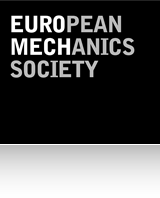541 – New Advances in the Nonlinear Dynamics and Control of Composites for Smart Engineering Design
Chairperson:
Prof. Stefano Lenci
Department of Architecture, Buildings and Structures
Polytechnic University of Marche
via Brecce Bianche
I-60131 Ancona
Italy
phone +39-071-2204552,
fax: +39-071-2204576
email: lenci@univpm.it
Co-chairperson
Prof. Jerzy Warminski
Department of Applied Mechanics
Lublin University of Technology
Nadbystrzycka 36
20-618 Lublin
Poland
email: j.warminski@pollub.pl
Joint colloquium EUROMECH with EUCASS
This is made possible thanks to the European Project E-CAero "EUROPEAN COLLABORATIVE OF AERONAUTICAL RESEARCH AND APPLICATIONS" (www.e-caero.com)
The proposed Euromech Colloquium is aimed at constituting an event to join scientists working on linear and, mainly, on nonlinear dynamics, chaos and control of systems and structures made of composite materials for smart applications. Indeed, the first goal of the proposed Colloquium is that of gathering people working on the most recent modeling, theoretical, analytical, numerical, experimental and control achievements in the nonlinear dynamics of composites.
There are still several open questions related to a full understanding of the nonlinear behavior of composites. Although all of them are in principle of interest for the scopes of the Colloquium, there are various key themes which are particularly attractive for the Colloquium.
The first is the modeling. Works dealing with the modeling of purely mechanical as well as multi-physics behaviors are solicited, including, e.g., thermo-electrical-mechanical coupling. Also the emerging frontier of modeling multi-functional laminates are of interest, especially when the layers devoted to other functions strongly interact with the layers providing the mechanical strength. Belong to this points even works dealing with the development and the assessment of reduced order dynamical models, as well as efficient numerical algorithms developed to detect complex mechanical and dynamical behaviors.
Another key issue is the exploitation of classical or modern control methods for optimizing the performances of composites materials and structures. Both open-loop and closed-loop applications of control methods are solicited if they are able to improve the performances and/or to reduces the costs, especially if they exploit the nonlinear dynamics of the uncontrolled or of the controlled system.
The second major aim is that of pushing the transfer of theoretical results towards modern and innovative applications of composites, in any field of science and engineering. The richness of the nonlinear dynamical behavior, from the one side, and the richness of the mechanical behavior of composites, from the other side, are ready to be merged towards significant technological developments in this area, in order to reduce the gap between theory and practice.
In this respect, any work presenting cutting-edge applications, even with “simple” theoretical/analytical/numerical background, will be highly welcome. At the same time, even “simple” applications of advanced and new behaviors of composites are solicited. There is no restrictions on the kind of technological area of interest, which can be classical (e.g. aeronautics), well-established (civil) or challenging for the future (e.g. bioengineering, MEMS). Prototypes development as well as preliminary experimental investigations of new devices are welcome, too.
As far as the methodological approach is concerned, both multidisciplinary and multi-approach researches are worthy for the scopes of the Colloquium.
The Conference will be organized within the Framework of the European Research Project “Centre of excellence for modern composites in applied aerospace and surface transport”, CEMCAST FP7-245479.
